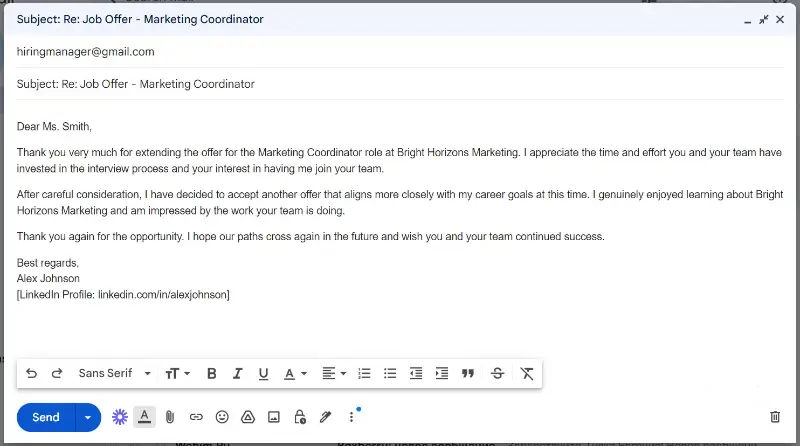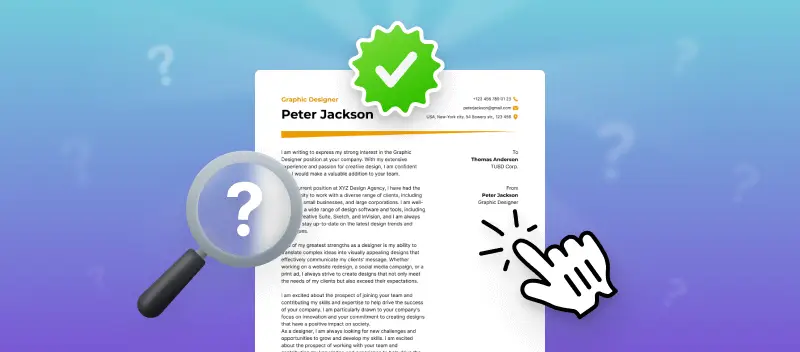Listing licenses on your resume is essential for showcasing qualifications, especially if your field requires specific certifications or legal permissions to practice.
Properly presenting them can enhance your credibility and make your job application more competitive. This guide will explain the best ways to showcase your licenses, ensuring they stand out to potential employers.
What are licenses?
These are official credentials granted by regulatory bodies, allowing individuals to legally perform tasks or professions.
The authorizations serve as proof that a person has met established criterions, such as completing necessary education, passing examinations, and gaining relevant experience. They are often expected in fields where public safety, financial integrity, or specialized knowledge is essential.
Licenses types
Certificates on resume vary across industries and can be mandatory for practicing certain practices.
| Category | License | Purpose |
|---|---|---|
| Professional Certifications | Medical License | Authorizes healthcare practitioners to work |
| CPA (Certified Public Accountant) | Confirms expertise in accounting and auditing | |
| Legal Bar Admission | Grants attorneys the right to practice law | |
| Educator Certification | Verifies teaching competencies | |
| Skilled Trades & Business | General Contractor Permit | Compulsory for managing construction projects |
| Electrician Certification | Ensures competence in electrical work | |
| Plumbing Endorsement | Grants authorization for water system maintenance | |
| Cosmetology License | Allows hairstylists and beauticians to operate legally | |
| Finance & Real Estate | Real Estate Agent Certification | Permits personnel to handle property transactions |
| Securities Licenses (Series 7, 63, etc.) | Fundamental for investment advisors | |
| Mortgage Broker Registration | Allows associates to arrange home loans | |
| Transportation & Operations | Commercial Driver’s License (CDL) | Indispensable for truck and bus drivers |
| Pilot Certification | Grants authority to operate aircraft | |
| Maritime | Requested for ship captains and sea professionals | |
| Environmental | HAZMAT Endorsement | Necessary for transporting hazardous materials |
| OSHA Compliance Certification | Verifies workplace safety knowledge | |
| EPA Accreditation | Assures proper handling of environmental hazards |
Many credentials have expiration dates and prescribe periodic renewal, often involving continuing education or retesting to ensure practitioners remain up to date with industry standards. Failing to maintain an active license can result in the inability to work legally in a given profession.
When to put license on resume?
Listing licenses on resume is needed when it adds value to your background or meets the job's demands.
Here’s a detailed guide on when it's appropriate to feature a testimonial:
- When the License Is Essential for the Role
Certain careers have legal or regulatory obligations that necessitate a specific certificate to practice. If a job posting explicitly mentions a licensed individual, it’s crucial to include this.
For positions in healthcare, law, finance, education, technical trades, and transportation, listing resume certifications ensures that you meet the qualifications and comply with regulations.
- When the License Boosts Your Application
Sometimes a distinction is not a strict requirement for an occupation, but it can still make your document more compelling. Having a relevant accreditation can distinguish you from other candidates by demonstrating specialized knowledge, commitment to your profession, and initiative.
A license can signal your dedication to personal and professional growth. It reflects your willingness to invest time and effort into staying current in your field.
Example:
- Certified Scrum Master (CSM) can be beneficial for project managers searching for agile-focused assignments.
- Google Analytics could enhance your proficiency for a digital marketing post.
- Personal Trainer License is an advantage when applying for fitness-related titles, even if not mandatory.
- When the License Shows Expertise
Certifications on resume often serve as a clear marker of advanced skills and knowledge in professions that impose precision and mastery. In vocations that depend on special mastery or talent, possessing a license highlights your competence and reassures employers or clients of your capabilities.
- Engineers with a PE license are recognized for their advanced understanding of design, systems, and technical problem-solving.
- Architects must be examined to ensure their savvy in understanding building codes, design principles, and construction regulations.
- CPAs are authorized to oversee financial statements, audits, and tax filings.
- When It’s Legally Mandatory for Employment
In certain sectors, having a valid certificate is not just an asset—it's a legal demand. In these cases, a license on resume guarantees that individuals adhere to industry standards and comply with laws that govern their field.
- Commercial Driver’s License (CDL): This is essential for truck drivers or bus operators.
- FAA Pilot License: Contributors pursuing a career in this sphere must have certification from the Federal Aviation Administration.
- OSHA Safety: Construction and manufacturing roles often call for such papers for workplace security.
How to list licenses on resume?
1. State the name
Be specific and use the full title of the resume licenses as it appears on official documents. Avoid abbreviations or shortened versions unless they are widely recognized.
For example:
- Certified Financial Planner (CFP)
- Licensed Clinical Social Worker (LCSW)
- Certified Human Resources Professional (CHRP)
2. Include the organization
To validate the authenticity of your certifications on resume, always write the name of the governing body that issued it. Employers may want to verify the legitimacy associated with that establishment.
Example:
- Certified Project Management Professional (PMP) – Issued by PMI
- Licensed Electrician – Issued by New York State Department of Labor
3. Provide the date
Listing the issue or expiration date of certification in resume adds further clarity and gives HR a sense of how current your qualifications are. If your document has an ending date, mention it, as it may be crucial for jobs that oblige ongoing authorizations. If the license doesn’t expire, note the issue date instead.
Example:
- Certified Public Accountant (CPA) – Issued by Texas State Board of Accountancy, May 2021, Expires: May 2026
- First Aid & CPR Certification – American Heart Association, January 2024, Expires: January 2026
4. Add license number (Optional)
Some professions, especially those involving regulated industries, may require the inclusion of your credential number. While it’s not always necessary, you can write it if it’s commonly requested.
Example:
- Licensed Architect – Issued by the California State Board of Architecture, License Number: 123456
5. Consider the order
If you have multiple licenses, place them in order of relevance or issue date. This ensures that the most applicable certificates on resume catch the employer’s attention first.
For example:
- Licensed Architect – Issued by the New York State Board of Architecture, May 2022
- LEED Accredited Professional – Issued by U.S. Green Building Council, November 2020
- Project Management Professional (PMP) – Issued by PMI, March 2019
Create your professional Resume in 10 minutes for FREE
Build My Resume
Where to put licenses on resume?
1. Special block
The resume certification section is the ideal location for important credentials, especially when the document is central to the job you're applying for.
- Where to Place: Position near the top of your application, usually right after the summary, or before your professional experience.
- How to Format: List each entry by name, the issuing body, and when it was awarded.
2. Education
If your license on resume is directly related to your academic background, it makes sense to include it here.
- Where to Place: Directly beneath your degree details, as part of the education-related information.
- How to Format: Write the diploma, followed by the license obtained, including the authority and the date.
3. Experience
If the certification in resume was vital for carrying out your responsibilities in a previous role, it may be appropriate to mention it under the work history.
- Where to Place: In the description for roles that required you to hold the license.
- How to Format: Note while outlining key tasks or accomplishments to show its relevance.
4. Opening statement
For highly relevant licenses, you can write them briefly in the summary. This approach emphasizes your prerequisites from the very beginning.
- Where to Place: Right after your contact information.
- How to Format: In one or two lines, add the key credential.
5. Skills
In roles where your resume licenses support technical expertise, you may choose to list it among competencies.
- Where to Place: After the objective, alongside other hard abilities.
- How to Format: Include the name and the certification body.
By following these guidelines, you ensure that your licenses on resume are prominently featured, easy to find, and clearly demonstrate your expertise.
License resume examples
Resume template with licenses
Example of how to add license to resume
Betty Carter
San Francisco, CA 94110
Phone: (123) 456-7890
Email: betty.carter@gmail.comProfessional Summary
Licensed attorney with experience in civil litigation, contract law, and employment law. Skilled in managing complex legal cases, providing expert legal counsel, and advocating for clients in court. Holds a California State Bar License and committed to providing high-quality legal services with a focus on client satisfaction.
Certifications
- Continuing Legal Education (CLE) – California, Completed: 2023
- Certified Mediator – California State Bar, Issued: 2019
- Licensed Attorney – State Bar of California, Admitted: 2016
Education
- Juris Doctor (JD) – University of California, Berkeley School of Law, Graduated: May 2015
- Bachelor of Arts in Political Science – University of California, Berkeley, Graduated: May 2012
Experience
Senior Associate Attorney | Law Firm of Martin & Associates
San Francisco, CA | March 2020 – Present
- Represent clients in civil litigation matters, including breach of contract, employment disputes, and business torts.
- Provide legal counsel and draft contracts, agreements, and memorandums.
- Successfully mediated and resolved over 30 employment law disputes, achieving favorable settlements for clients.
- Conduct in-depth legal research and draft motions for trial.
- Mentor junior associates and provide guidance on case strategies and legal procedures.
Associate Attorney | Carter & Thompson Law Group
San Francisco, CA | July 2015 – February 2020
- Specialize in advising clients on employment law issues, including wrongful termination and workplace discrimination.
- Litigated employment law cases in state and federal courts, achieving favorable outcomes in 80% of cases.
- Conducted legal research and analysis for complex business transactions and corporate compliance matters.
- Assisted in managing a team of paralegals and legal assistants to prepare trial documents and legal filings.
Skills
- Litigation & Trial Advocacy
- Contract Drafting & Negotiation
- Employment Law (Discrimination, Harassment, Wrongful Termination)
- Mediation & Alternative Dispute Resolution
- Legal Research & Writing
- Client Counseling & Communication
- Legal Document Drafting (Pleadings, Motions, Contracts)
Professional Affiliations
- Member, State Bar of California
- Member, San Francisco Bar Association
- Member, American Bar Association (ABA)
Awards
- Top 40 Under 40 Lawyers – San Francisco Legal Review, 2021
- Excellence in Legal Writing Award – University of California, Berkeley School of Law, 2015
Languages
- Spanish (Fluent)
Sample with resume certification section
Conclusion
In conclusion, listing licenses on your resume is a vital step in demonstrating your qualifications and meeting industry-specific expectations.
By presenting your certifications clearly and thoughtfully, you strengthen your application, helping to differentiate yourself in a competitive job market.
Create your professional Resume in 10 minutes for FREE
Build My Resume





